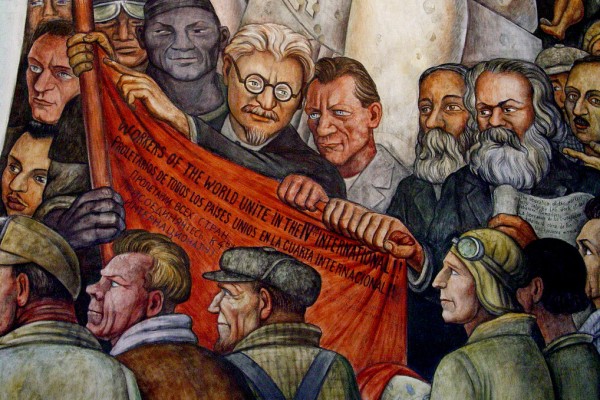Dialectics of Santa Claus by Karl Marx

Image courtesy of the United States Library of Congress
An undiscovered text by Karl Marx titled, Dialectics of Santa Claus: Critique of Santa Claus is Coming to Town has emerged. Here is Marx’s analysis of Santa using materialist dialectics:
A review of Hegel’s Science of Logic teaches us to go beyond mere appearances, to indeed “look at things twice”. Notice the relationship, the very contradiction of daily lived experience of being judged “naughty or nice”. The notion of a Santa Claus (a character based on the the religious reference to St. Nicholas now turned into a fetishized figure created during the full swing of expansive industrial capitalism in order to promote the selling of commodities who apparently “sees you when you’re sleeping” and “knows when you’re awake”, thus a society where one lives the inescapable real alienation 24 hours a day. Note further that this quasi-supernatural figure, recreated during a season in the bodies of men (and now sometimes women)), reinforces the quasi-Christian divinity of one who knows when you’ve been “bad” or “good” (that unity of opposites that can only define what is good in a relationship to what is bad). The increasing commodification of this being who is Caucasian and has a white beard, reinforces the myth of white men as benevolent, yet, at the very same time enforces the idea upon children that commodities (that are actually bought through the sale of their parent’s labour power) are free. The use-value of the commodity for children is only the a result of the real, concrete exchange value of the commodity. Yet we can take this dialectical analysis to an even deeper level even further, that Santa Claus (as a “symbol”) is a negation of capitalist ethics, values and practice and in order to achieve such a free society one must negate the negation.
This fragment of Marx’s writing has opened the doors to new dialectical analysis. There is, of course, Slavoj Žižek’s new book, The Perverse Recoil of St. Nick: A Reinterpretation. He insists that we must look beyond and previously to a Hegelian critique of Marx via Lacan. Žižek insists that not only was Marx not Marxist enough, but that Hegel was not Hegelian enough, adding that Marx was not Hegelian enough and Hegel was not Marxist enough. Santa, he insists, is the third part of the Christian trinity (as the “Holy Ghost”), the “spirit” that survives as all of us in faith (recall the movie starring Tim Allen, Santa Claus 3, The Escape Claus). The leap would be a subjective one into the unknown. Žižek, as always, accentuates his analysis with many scatological references (starting with Martin Luther).
But what is one to make of Claus seeing us when we are awake and asleep? Is this the “all seeing eye”, seen on the back of a U.S. dollar bill, the fetishism of money as the equivalent of all commodities that invades our consciousness whether we are awake or asleep, that value recognized by Marx in Capital, Volume I described as the “fetishism of commodities”. Let me give it a further twist a la Žižek even looking at Eisenstein’s Ivan the Terrible. Does not such symbolism invade the film in the knowing eye of Jesus painted on the Tsar’s wall implying the all seeing eye of the trinity God/Jesus/the State. I will take this even further relying upon the revolutionary surrealist analysis of Andre Breton that our consciousness is linked to our dreams, making this eye therefore inescapable. Does such then imply the bourgeoisie’s hope that capitalism is all-invading, indeed inescapable?
Perhaps we can surmise that he answers Raya Dunayevskaya’s little known treatise, The Notion of Claus and Hegel’s Absolute (published in 1969) where she again entreats us to reread Lenin’s Philosophical Notebooks (admonishing opponents to ‘Leap, leap, leap!’). Žižek would make this a dialectical ‘leap’ into the unknown forgetting Lenin’s own rhumba like criticism of One Step Forward, Two Steps Back that addresses the hidden meaning in The Twelve Days of Christmas, that praising of primitive capital accumulation of buying commodities (a partridge, two turtle doves, pipers who pipe, eight dancing ladies, swans for the equivalent of their monetary value five golden rings). The lords (referring to the ruling class) leaped 10 times only to remain in one place. Lenin’s dictum teaches us that it is not the Quantity of Leaps that matters, but the Quality of the Leaps.
Marxologists may recall that Marx wrote history would repeat itself first as tragedy and then as farce. They often forget that philosophy repeats itself as comedy.
Len Wallace is a labour studies professor at the University of Windsor, as well as an accordionist and songwriter.






_The_Payment_of_the_Tithes_Bonhams_600_400_90_s_c1.jpeg)


